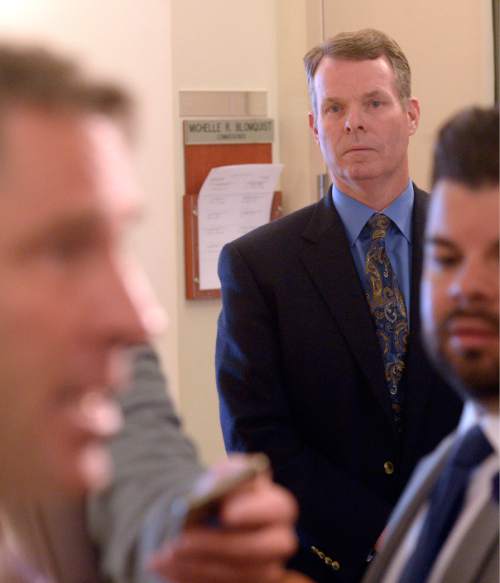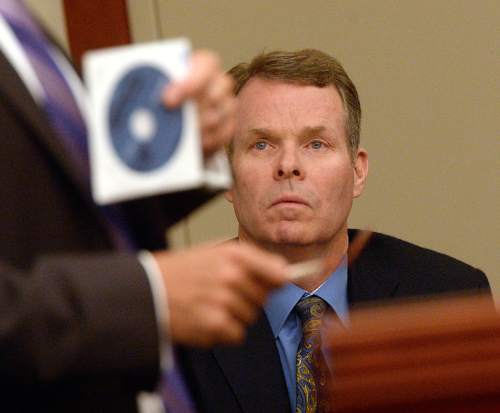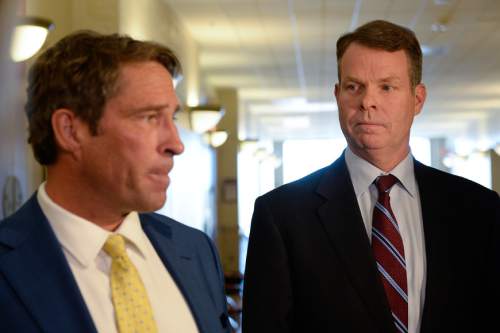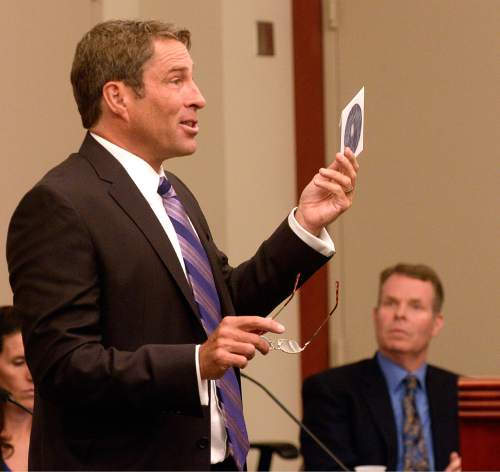This is an archived article that was published on sltrib.com in 2016, and information in the article may be outdated. It is provided only for personal research purposes and may not be reprinted.
Former Utah Attorney General John Swallow wants the Utah Supreme Court to decide whether his constitutional right to a fair trial was violated when prosecutors and investigators seized his protected email communications with a defense lawyer.
Swallow, who is accused of public corruption-related crimes, raised the issue with 3rd District Court in an April motion to dismiss the case, but lost that argument.
On Thursday, his new attorneys filed a petition with the Utah Court of Appeals, asking that the issue be passed directly to Utah's highest court because the case is the first of its kind.
"There are no Utah cases that address the consequences when the prosecution intrudes into the defendant's attorney-client relationship, and the cases from other jurisdictions have taken a number of different approaches to resolve this important question," attorney Linda M. Jones wrote. "This issue of first impression has wide applicability to cases involving electronic discovery and should be decided by the Utah Supreme Court."
The petition asks the justices to overturn the decision of the trial-court judge, Elizabeth Hruby-Mills, and grant Swallow's motion to dismiss the case.
In the alternative, Swallow wants justices to order an evidentiary hearing so his lawyers can question prosecutors and investigators — a hearing Hruby-Mills also denied.
In other jurisdictions, courts have ordered such hearings to determine whether the handling of electronic evidence violated a defendant's rights, Jones contends.
"Granting the petition and addressing the issues now will allow Mr. Swallow the opportunity to examine the evidence in a timely fashion," she argued. "Moreover, granting the petition now and addressing the issues will affect how the parties move forward with the case."
It was unclear Friday when the appellate court might rule.
Salt Lake County District Attorney Sim Gill said Friday he knew Swallow's attorneys planned to pursue an appeal, but he has not yet seen the filing.
"This is the way our process works," he said. "We're just going to have to see what the arguments are, address the issues as they are raised and respond in the appropriate forum."
Meanwhile, he said, his office will continue to press forward with the Swallow prosecution.
Swallow has pleaded not guilty to 14 felony and misdemeanor charges, including counts of money laundering, misuse of public funds, obstruction of justice and falsifying government records.
A trial is set for February 2017. If convicted, Swallow faces up to 30 years in prison.
The charges stem from allegations of a pay-to-play scheme inside the Utah Attorney General's Office, both when Swallow was a chief deputy and after his 2012 election to the state's top law enforcement job. He stepped down from the post after serving less than a year.
Investigators raided Swallow's Sandy home in June 2014, seizing computers, tablets and other e-devices, which contained private family communications and roughly 12,000 emails between Swallows and his then-attorney Rodney Snow.
Snow advised prosecutors on the day of the raid that protected materials would be found and later submitted a 158-page "privilege log" referencing the material, without response, according to the documents.
Included in the emails were discussions between Swallow and Snow about possible legal strategies or actions their client might take during the investigation.
Swallow's current defense team discovered the emails had been commingled with other evidence during keyword searches earlier this year.
Gill has maintained that his office was unaware that the emails, which were handled by the FBI, had been mixed with other evidence and said his office did not read or use the materials.
Hruby-Mills sided with Gill, saying prosecutors had not acted intentionally and that there was no proof of any injury to Swallow.
Jones argues gaps, inconsistencies and contradictions exist in the government's explanations of how the evidence was handled.
"Under the circumstances," she wrote, "if the case is not summarily dismissed, the scope of the state's violation and an appropriate alternative remedy can be determined only after an evidentiary hearing."
In the digital age, Jones noted, the evidence-handling issue is likely to recur in other criminal cases. In the absence of Utah case law on the issue, she adds, the state's high court should decide what standards of review apply when problems arise and what remedies defendants are allowed.









